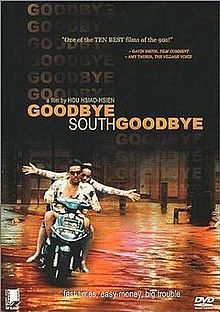| Goodbye South, Goodbye | |
|---|---|
 DVD Cover | |
| Traditional Chinese | 南國再見,南國 |
| Simplified Chinese | 南国再见,南国 |
| Literal meaning | Goodbye South, Goodbye |
| Hanyu Pinyin | Nánguó zàijiàn, nánguó |
| Directed by | Hou Hsiao-hsien |
| Screenplay by | Chu T’ien-wen |
| Story by | Jack Kao King Jieh-Wen |
| Produced by | Katsuhiro Mizuno Shozo Ichiyama King Jieh-wen Huang Chong Ben Hsieh |
| Starring | Jack Kao Lim Giong Annie Shizuka Inoh Hsi Hsiang Hsu Kuei-Ying |
| Cinematography | Mark Lee Ping Bin Chen Hwai-en |
| Edited by | Liao Ching-Song |
| Music by | Lim Giong Summer Lei L.T.K. |
Production companies | 3H Films Team Okuyama |
Release date |
|
Running time | 116 minutes |
| Countries | Taiwan Japan |
| Languages | Mandarin Hokkien |
Goodbye South, Goodbye is a 1996 Taiwanese drama film directed by Hou Hsiao-hsien. The film had its premiere at the Cannes Film Festival on 12 May 1996.